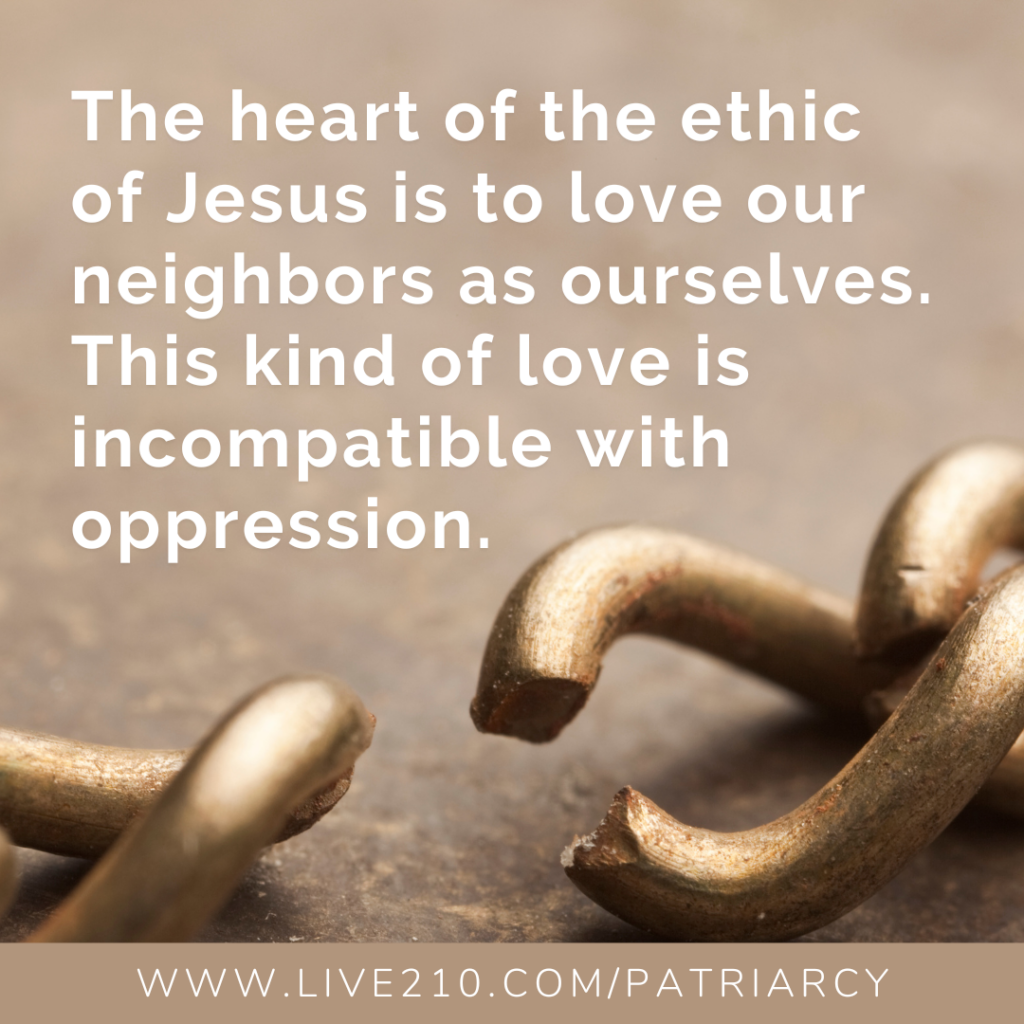I’ll start with the conclusion: Followers of Jesus are called to join him in his mission. In case we get confused, he defined his mission for us in Luke’s gospel. 1See Luke 4:16-21. If our message and actions don’t bring good news to the poor, freedom to prisoners, sight to the blind, and freedom to the oppressed, we’re off track.
This has broad implications for how we see and relate to others. Specifically, this mission challenges how we treat women, immigrants, and anyone pushed to the margins because of their body, ethnicity, or sexuality. The terrible truth of history is that many Christians and Christian institutions have participated in the oppression, marginalization, and silencing of these groups. Wherever this happens, we betray our Lord and his mission.
This particular post is about one application of this principle: how historical blindness and the influence of patriarchal culture have led the church to violate Jesus’ mission of good news and freedom from oppression in regard to women.
Growing up in the church, I assumed that the message I heard each week in church was precisely what I would have heard if I’d shown up in a 1st-century house church, as we all listened to the preaching of John, Peter or Paul. I also grew up in a denomination that talked a lot about church history, so I thought I knew all about it. Only as an adult did I discover I’d been taught a structured presentation of church history designed to demonstrate that our particular theological emphasis was merely the final and inevitable conclusion of God’s work in history. Our denomination was the next stage in the long line of reformers, all entrusted with the same message, all the way back to the Apostles and Jesus.
As a pastor with the privilege of talking about these things with many people, I’ve learned that my experience isn’t unique. We tend to delete two thousand years of theological discussion and debate in order to forge a direct link between the apostles and our church. Where we know church history, we often cling to a highly curated historical narrative meant to justify our sense of being right.
Without historical education, we assume the past was much like our time, just less convenient—the same concerns, the same vision of culture, but without light switches and the internet. When we read scripture with this assumption, we can’t help but misread it. We assume the authors were answering our questions rather than their own.
Worse, when we don’t understand the theological discussions of the past, we leave space for teachers and preachers today to fill in the missing meaning. Many good church people assume that the interpretation their pastor offers represents the unanimous voice of Christians past. Most Christians don’t know that there have been many, many orthodox Christian thinkers over the past two thousand years who disagree on issues like creation, gender roles, the work of the Spirit, the nature of the Trinity, heck… the list of disagreements is longer than the list of agreements! When someone says, “the early church believed…” or “the Bible clearly says,” they obscure the reality: Church history is the history of diverse communities reading and interpreting scripture in different ways.
Wait… Isn’t Patriarchy God’s will?
For this reason, I am so thankful for a new cohort of thoughtful Christian scholars and historians addressing this gap. One of these is Beth Allison Barr, with her book, The Making of Biblical Womanhood: How the Subjugation of Women Became Gospel Truth. In this book, she tackles this problem in relation to the view of women and their roles.
Today, in Christianity, particularly American Evangelical Christianity, with its broad and global influence, a particular notion of the God-ordained role of women is being taught. This view, sometimes called Male headship, or more generously, Complementarianism, proposes that God’s ordained role for women is under the authority and leadership of men. Prominent theological voices within this community, such as John Piper and Wayne Grudem, teach that their view on this matter is the historic Christian view.
Because many of us don’t know our history, we assume these guys must be right. Some Christians, with a deep commitment to honor God and follow scripture, support this interpretation—even if they don’t like it. Many couples give verbal assent to complementarianism because they believe it’s God’s will but are quietly egalitarian in practice.
Other Christians, seeing the embedded hierarchy and oppression within this view, reject it and, in doing so, assume they must also reject particular scriptures in order to love their neighbors well. I had one person tell me they could either love their neighbor or the Apostle Paul, but not both! I’ve sat in my pastoral office with women struggling in clearly abusive marriages because they want to honor God and assume that must mean obeying their husbands.
All these people share the same assumption: that complementarianism is God’s intention for human relationships as revealed in scripture and uniformly held by orthodox Christians historically. They are wrong. With accessible prose, Barr walks through the historical development of “Biblical womanhood.” She shows (perhaps to our surprise) that the kind of “Biblical Womanhood” taught today is relatively recent, drawing on several historical threads. Rather than being rooted in Christian doctrine, it is a spiritualized version of an old secular social structure, the household codes of Greco-Roman patriarchy! Barr further demonstrates how the Protestant Reformation had the tools necessary to provide freedom and equality to women, and many voices spoke for this. Sadly, instead of applying the “priesthood of all believers” to women, Reformation leaders chose to limit that authority to men, in a direct betrayal of the Reformation’s theological premises.
This historical integration of cultural patriarchy into the Christian message has always had an opposing voice. This alternative perspective found its basis in the teaching of Jesus and an understanding of the Gospel’s work of setting the oppressed free. Citing historical documents, Barr shows how the early church, and even the Western church in the Middle Ages, was attractive to women precisely because it was a place where they were valued as human beings. Their spiritual gifts were recognized, and they could lead, in contrast to the secular culture of the time. Barr points out how, at critical historical points, men banded together against the movement of women’s autonomy in order to maintain their shared authority, justifying it as the will of God.

If you ever had a pastor warn you about the encroaching influence of culture, you might sense the painful irony! Those Christian leaders today who claim that feminism and the movement toward autonomy for women is evidence of the dangerous encroachment of secular culture into the church have it precisely backward. Jesus’ message brought freedom. The early church and many historic Christian communities knew this applied to women. What crept into the church was cultural patriarchy! It happened over and over and is a battle that’s raging again today.2An interesting side note: Barr brings clear receipts that show how the ESV, one of the current most popular English translations of the Bible, was explicitly envisioned to counteract gender-inclusive and egalitarian readings of scripture. While I knew from my study that it was a heavily slanted translation, I did not realize the ESV was not technically a translation al all, but simply a theological revision of the 1971 RSV.
While Barr’s book is focused on patriarchy and the Christian vision of the role of women, she also notes the deeply enmeshed connection between patriarchy and racism. While her book is not about racism, she notes how patriarchy, by necessity, defines people according to worth and dignity. This always results in hierarchies based on race as well as gender.3I’d add that Patriarchy also requires hierarchies of class, ability, and sexuality. Barr shows how these discriminatory hierarchies have evolved historically, taking on different forms precisely so that those who benefit can avoid the spotlight of individual culpability and take shelter in the “this is just how it is” quality of systemic injustice.
Barr ends the book with a clear and simple statement: “Biblical womanhood is Christian patriarchy,” and she leaves no margin for the kinder, gentler version either. “Complementarianism is patriarchy. Patriarchy is about power. Neither have ever been about Jesus.”
There is a better way of being Christian.
If you are a woman, hear this: God sees and values you as a full human worthy of dignity and respect. Any Christian doctrine or community that ignores or disagrees with this is violating the way of Jesus.
If you are a man who has long struggled with the idea that God intends you to command and dominate women, your spiritual intuition is correct. You can release the hold this belief has on you. The way of Jesus is the way of mutual submission rather than domination, the way of other-centered love rather than self-centered elevation. Patriarchy hurts you, too.
If you are stuck because you want to honor God and believe scripture requires you to hold this hierarchical view, I encourage you to keep reading and inviting the Spirit to guide you. The Making of Biblical Womanhood: How the Subjugation of Women Became Gospel Truth, by Beth Allison Barr, is a great place to start. I recommend following it up with Jesus & John Wayne: How White Evangelicals Corrupted a Faith and Fractured a Nation, by Kristin Kobes Du Mez. Then, if you’re ready to enter the deep waters, pick up The Color of Compromise: The Truth about the American Church’s Complicity in Racism, by Jemar Tisbey. All three are well-researched, historically substantiated, and Biblically astute. All are written by scholars who love the church. These crucial books function not only as historical education but also as prophetic calls for Christians to live out the way of Jesus more faithfully.
The heart of the Christian ethic Jesus gave is to love our neighbors as ourselves. This kind of love is incompatible with oppression. It doesn’t matter what theological justifications can be brought to bear or how many individual scriptures can be leveraged in favor of the oppression. Jesus’ self-identified mission includes bringing liberation, which is the mission we are invited to participate in.
- 1See Luke 4:16-21
- 2An interesting side note: Barr brings clear receipts that show how the ESV, one of the current most popular English translations of the Bible, was explicitly envisioned to counteract gender-inclusive and egalitarian readings of scripture. While I knew from my study that it was a heavily slanted translation, I did not realize the ESV was not technically a translation al all, but simply a theological revision of the 1971 RSV.
- 3I’d add that Patriarchy also requires hierarchies of class, ability, and sexuality.

VERY Excellent writeup and explanation! Thank you! At least “someone” out there understands and is attempting to expose the messed up thinking that is so predominant toward women in and out of churches, and indeed in our whole society and world! Those males “in power”, or who “perceive” themselves in power, will do almost anything to retain that sad sick illusion of control. And it has become just so EXTREMELY tiresome to myself and all of womanhood!
Thank you for your voice!
Hey Cindy, thanks for speaking up. You’re right, and its long past time we did things differently.